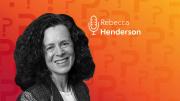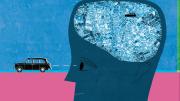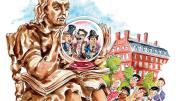Dean Long, faculty and staff, and guests, good afternoon to all who today mark this important moment in these graduates’ lives. I begin on this auspicious occasion by thanking those who have given so much to assist these graduates in their aspirations and endeavors: faculty and staff of this esteemed institution; family, friends and mentors; detractors who sought to dissuade them from their pursuits and instead spurred them to dig deeper and persist in their goal and, most of all, the teachers who created the means for their intellect to blossom, their independence of mind to become rooted in knowledge, their courage to grow and be fortified and their sight line to be lifted far above what they thought possible. God bless teachers for doing that most essential and elevated of human endeavors – caring for the young.
Now, finally, but no less importantly, to today’s graduates who arrived at this point after years of growth and challenge, congratulations.This day is about you and the beautiful music you will make in your careers - music that will nourish and inspire generations of learners and strivers.Whether that music is mellifluous or atonal from time to time, it will doubtless move many to enlightenment and discovery, propelling them through myriad challenges over the course of their lifetime. This day is for you educators without whom fewer new discoveries would be made.It is for you who have the power to enlarge human understanding and make salient our common humanity.It is for you who offer a path to those who cannot see beyond the mountain of impediments obstructing their view to the horizon.Yes, on this day, we raise a song to you for your belief in what is possible with learning.Our thanks to each of you for committing yourselves to empowering others to improve the world.
As I prepared for today’s ceremony, I couldn’t help but worry about what I might say to send you on your way with a determined hopefulness about the future.I thought about recent events here and around the world that raise pressing questions about how we can advance.It is not, I think, overstating the challenges of the environment that educators face today by saying that, more and more extraordinarily burdensome worries cast a pall over our formal learning environments.These worries are such that they might cause students to question their prospects for a useful and fulfilling life.What new tragedy, they must ask, will arise tomorrow to unsettle further their future?What old hatreds will reemerge, slamming shut doors that heretofore stood ajar?More and more often, it seems such doubts are the ever-present companions for students from the time they start school until they graduate from college.
Think of it:a student graduating today with an undergraduate degree will have begun school at the time of the mass shooting at Virginia Tech that killed 32 people.That same year, the IPhone debuted, the Harry Potter series began and the Great Recession loomed. They and every generation of learners since have grown up and studied through a dizzying array of events that call into question whether modern society will ever afford the ever hoped-for steady upward trajectory of progress.Fortunately, you will be called on to provide that hope to those who face ever present doubts as they attempt to focus on doing their best.
There was perhaps a time when educators like you chose their path because of the certainty that it offered.While they perhaps knew there might be ruts along the way but thought these could be managed, the frequency of destabilizing events today has added a new dimension to the consideration of a career in education.Whether teacher, administrator, researcher, policy maker or leader, educators are now frontline workers with the task of not merely providing a service but the duty to bring to the world a vision of what is possible even when sign posts reading “Danger ahead. Do not proceed” are ever present. I must confess that when I am using my GPS, I am always startled and indeed troubled when the voice from this application says ominously “Caution. Danger ahead!”The warning alone sends me into a state of high apprehension.I immediately begin to worry about what I will face ahead. Should I exit the road and look for alternate routes?Should I slow down to a crawl? How will I react if there is a serious accident and there are injuries?Will that picture be in my head and derail my activities for the day?Most frequently, I proceed with caution only to discover that the ominous voice has overstated the danger.Nevertheless, the warning has had an effect.
Such is the difficulty of these times when ominous warnings and real catastrophic events are ubiquitous, causing us to be wary of the path ahead.As amateur futurists and inevitable purveyors of hope to those beset by this reality, how are you to ensure that you do not lose your vision and hopefulness at a moment when education itself is under assault?
Of course, effective responses to challenges is the life blood of societal advancement and the product of a strong education.As educators, we welcome new tools of learning and short cuts to research and discovery in the interest of efficient problem solving.The advent of computing and other technologically advanced devices that speed time to and enlarge the capacity of problem solving has not only facilitated many life-saving and life sustaining efforts but it has also made possible ready access to information that would previously have been inaccessible.There is no question that the learning environment is richer for the students and teachers able to take advantage of these tools.
Yet, we have not yet discovered the means to accommodate the need for greater cultural understanding in spite of the fact that much information is now available to us in ways that should assist us in being more aware of the complexity of the world and the variety of people inhabiting it. While, in previous times, we believed that narrowness of mind was a condition of not having access to information, we now can see that the narrow vision that afflicts us is often a willful condition enabled by self-applied blinders.And so, in spite of the growing number of aids to education, we have, it seems, a growing number of impediments to full enlightenment.
What does the educator face in this new environment?
At a moment when we should be the most informed, poisonous, invective laden and unsubstantiated assertions are hurled across political divides and into our schools and colleges.So-called “false facts” have come to replace conclusions supported by rigorous analysis and are deployed often casually as a means of navigating difficult issues and forestalling undesired outcomes.As much as we assert the need for careful and objective analysis to inform our decisions and actions, some take the opposite course, inflaming others to believe that irrational analysis and the creation of unsubstantiated evidence is a legitimate course when advancing narrow interests.Uninformed armchair theorists and activists aim their ire and their strategy at overturning the shape and content of education at every level.
These interlopers who lack the knowledge and expertise to shape any educational content would lay siege to a profession that, since Horace Mann, has built brick by brick the wherewithal for the world to advance in unimagined ways, creating myriad paths to astounding discoveries that save lives and habitats and advance the overall well-being of societies.
I was born in a time of darkness and limitations.Unknowing demagogues ordered that every person of my ilk should be relegated to limited education and achievement.Enlightened individuals resisted the calls for permanent enslavement of our minds and aspirations and, with the help of educators, I was able to have access not only to learning but to hope in the future. Like the Graduate School of Education at Harvard, these educators sought “to promote success of all learners by putting powerful ideas into practice.”Because they fought the pernicious ideas that would have dampened innovation and consigned generations to be mere observers of the march of progress, we all won with a stronger nation and the inclusion of previously barred groups from the constitutional rights afforded citizens.
As those committed to leveling the playing field, we find ourselves under attack for the basic tenet that led Horace Mann to call for universal education: that everyone should have access to learning that enables them to live better and more fulfilling lives.More and more, public figures feel secure in advocating for an end to the ideal of equal access. The principle that providing for those least able to advocate for themselves makes us stronger as a nation has given way it seems to the thought that only certain elites should avail themselves of the best that we can provide.The contempt for and inhumane treatment of vulnerable populations has garnered a surprising degree of support making it challenging to secure the funding needed to educate those populations.
The attack upon educators is a means to achieving fundamentally base aims.Those who are most expert in shaping the education of learners have become bad actors, inserting into curricula subjects that are inimical to some individuals’ political and tribal goals.The way to upend the influence of educators is to call into question their qualifications to play such an important role.Parents, religious groups and public officials, they argue, should have the strongest voice in shaping the education of young people.While debate is healthy and the involvement of communities in the educational mix is welcome, undermining the most knowledgeable and expert educators in the task of building learning communities is misguided and unwise.
Whatever the nature and source of the attacks or the instability we face, our young people must feel it even more acutely for they are less familiar with dystopian periods in our history.And so, I am given to reminding my students that we have been here before.Often, they are incredulous when they hear that and so I have to tell them about growing up in the 40’s and 50’s in the Jim Crow south.Growing up in the country at a time and in areas where evil reigned, I’m certain that I felt as many young people today feel - overwhelmed. Lynchings for being in the wrong place, assassinations for espousing freedom, public policy governed by racial hatred, and segregation?Yes, I was overwhelmed at times by the magnitude of the ills I perceived.Yet, something happened to help me see beyond a pervasive fog of malevolence.Teachers.Educators.
I am amazed even today to recall how hopeful they seemed in the face of overwhelming circumstances.As a lifelong educator, I can understand how their calling imbued in them a hopefulness that could not be stanched by signs of danger ahead.Those of us drawn to education invariably believe that by assuring people’s ability to evolve through learning, we will always have a way out of madness.We believe that by enlightening others, we have an opportunity to shape a common understanding of our humanity.We know that, by probing deeply into what is and can be known, we can withstand any assault on our humanity and on our future.
Many outside of our profession are also persuaded of the importance of education.Charles Butt, Chairman of HEB, a Texas chain of grocery stores, was so driven by the conviction that how well we educate our children will define our future as a nation that through a magnanimous personal gift, he established a center for leadership of public education.His project, the Holdsworth Center whose board I was pleased to chair for six years, has helped over 1,400 educators from 50 school districts build stronger leadership.That is what it will take to weather the current environment: the support of educators, business people, volunteers and others of equally good faith who agree that only courageous and able educators can continue to protect the ability of all children to have access to the education they deserve.
You, more than any, have at your disposal the capacity to shape the future.By embracing education, you are clutching the lifeline to a sane and sensible future for our children.It may well be that we will endure periods of hostility to the notion of education or antipathy towards everything we value as educators but time will demonstrate that educators play a pivotal role in what the world can be in the future. The results speak for themselves.Learners have, across centuries, benefitted from the courageous actions of theorists, inventors, philosophers, writers, artists and others who have together formed a powerful redoubt against misguided individuals who sought to ban knowledge and limit the capacity of learners.
It is now our turn to draw upon their example and resist efforts to create a new dark age that inculcates learners and society with self-serving false information.I hope that you will take this oath of office:that you will do your best to exemplify and defend the bedrock values of education:truth, open-mindedness, independence and rigor of thought and a commitment to the advancement of society.If you accept these values and live up to them, you will forever be hopeful, forever strong in your views of what matters, and forever able to heal this nation. Yours is a calling above all others.
Thank you for embracing this magnificent profession.





